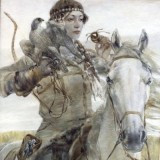Game of Thrones...
-
Milly Hayward
6 years ago, updated 6 years agoI am genuinely fascinated to understand why it is that so many people love Game of Thrones and yet others totally detest it. I never read any of the books but did see the series and was completely addicted. Not particularly into the gore but the twists and turns of plot I found really fascinating. People who you wouldn't normally expect to die being killed off when you least expected it raised in me the what on earth is going to happen next addiction.
I think maybe because I didn't read the books I had no expectation about what the characters would look like so character casting looked fine to me. It made me think about the power struggles in our own history - It has been established that in the real world murders and atrocities have been committed throughout history for the gain of power and so I thought maybe even though it was a fantasy it perhaps reflected the truth of what lengths humanity will go to in its greed for power.
I would be genuinely interested to hear about other people's reasons and feelings for either not liking or liking it just to help understand what it is about the show that could have inspired such a widely differing almost Marmite reaction. -
silvershoes replied to Milly Hayward
6 years ago, updated 6 years agoA Song of Ice and Fire was my favorite book series for years and years. I was part of a very small fan base and I spoke to George RR Martin multiple times (on his silly little website, which probably no longer exists). The story and the characters were incredibly important to me during my formative years. I was daenerysstormborn on PnQ when I was 14 years old, which was 16 years ago. That was my first online handle. I knew almost no one else who read the series. I convinced one PnQ member to read the first book and he thought it was terrible (he's no longer on this site but we are still FB friends and he was infatuated with the TV series, which made me eye roll). I tried to convince dozens of others to read the books to no avail. Honestly, being a fantasy book nerd contributed to how much I was bullied during my teenage years. Yet when the book was adapted to a show by HBO it became the most popular TV show ever created. The bullies who mocked me for liking the books LOVED the show. I'm admittedly bitter about it. I feel that something that was deeply personal to me has been taken and made into mass marketed media that appeals to everyone. For years now I rarely go a day without someone mentioning "Game of Thrones." It's mentioned in every other TV show I watch. All of my family and friends watch/watched it. It's like this thing that was so personal and important to me that I tried to share, very unsuccessfully, only needed to be picked up by someone or something (HBO) more appealing than me for everyone to finally see its value. I feel that it was stolen from me, as petty or silly as that sounds. It's a sore spot for me. And yes, the casting hurts me. I disagree with almost all of the casting... it's not what I imagined. I watched the first season of the show and thought it was bearable. The second season, when the prostitutes start going at it together in front of Petyr, I called it quits. That's not in the books. Pure sexualization and objectification to appeal to viewers. I haven't watched any of the show since and I'm better for it as far as I'm concerned. What pains me the most, above all else, is Martin dedicated so much time to the show that he further put off writing AND my guess is the show will impact the books since the show went beyond the books. I'm very upset about that :(
-
Milly Hayward replied to silvershoes
6 years ago, updated 6 years agoI am sorry that you were bullied over being a book nerd over those books I think that was one of the reasons that I too was bullied at school. (not for reading the same books but for being a total bookworm) Finding out that the bullies actually like the stories that you loved must have been awful and their connection will have brought back bad memories tainted your memories of the book it is natural. But don't give them the power to take away such a precious memory from you. The book is clearly better than the series. Hang on to all that you love from the books and just think that actually they haven't read the real treasure which is the book version. That still remains your treasure and always will be..
I think you have hit upon what may be the main reason that there is such a divide on whether people love or hate the series.. If people have read the book and the filmmakers have messed with the plots and characters then of course they will hate it. In contrast if you have never read the books (like me) then you have nothing to compare it against so are more likely to love it.
The only thing I have to compare is that I love the Sword of Shannara books written by Terry Brooks and they bought out an abomination of a series that made the book barely recognisable. I had been so looking forward to seeing it brought to the screens and when it did it bore no resemblance to the characters or the plots it was a huge disappointment. I kept thinking if only they had kept true to the books and produced a series of movies instead then they would have had another epic like Lord of the Rings and the Hobbit on their hands I just couldn't watch it because each scene got me more riled than the last.
-
Maple Tree
6 years agoMy Husband read the books and when the series came out he said to me "You are gonna love this show". I really do. Im a huge fan of the show... the shock factory is wild, the twists and turns are amazing and when it ended this year I was bummed. I am looking forward to the Prequels.
-
D.
6 years agoI loved the books, and the Television show! Having said that, during season 6, the quality started to dip and by season 8, it was a completely illogical mess, becoming some rushed, high-budget blockbuster. Entertaining, definitely, but the dialogue and writing suffered significantly. The first 5 seasons had some of the greatest writing I've ever seen in television, mostly due to the fact they had access to Martin's source material. The two showrunners ran it into the ground a little once they lost access to the books, and it's a shame that it'll likely be remembered by many by the reputation of season 8...
I'm not quite sure how people could hate it, though. Granted, lots of people are not into that sort of thing, plus some of the subject matter was particularly dark earlier on for some. There are times though, the more something is loved, the more people actually want to hate it. -
nouriguess
6 years ago, updated 6 years agoI loved it until the first episode of 7th season. Then it went awfully bad. So disappointing. Worst ending ever. The last season was a train wreck. How Daenedys was killed is just very absurd. How the Night King was killed is even more absurd. Blegh.
Mm. I loved Tyrion Lannister a lot, though. -
Poet on the Piano replied to silvershoes
6 years ago, updated 6 years agoJane, no one should ever have to go through that, being mocked and treated so low. Just how you speak about the book series and how it impacted you, how you speak passionately about it, that's powerful! And no one should ever try to steal, demean or belittle that.
It is not petty or silly at all to feel strongly. I can't imagine how I would feel seeing the change and popularity and growth when HBO adapted it and reflecting on what themes are brought to the audience's attention that may not be authentic in the books, to gain views. Hold on to the beauty and wonder of the books. Oh, and it is SUPER cool you were able to speak with the author multiple times on-line! What a neat connection I hope you can always look back on. I think that would really be inspiring as a teen, to have this close to you and have it hold such meaning.
I will say, my friend and I watched the first season while dog-sitting. We honestly started watching it because so many people around were referencing it and perhaps we wanted a taste of that too, of being able to do the same and relate. I wish I could have enjoyed it on my own accord, if that makes sense? Instead of constantly hearing about it and feeling like I had to watch it just to say "oh yeah, I've seen it!". It wasn't boring to me, there were lots of graphic scenes and shocks, I simply had no connection or real pull to continue and to keep following the plot. My friend did though and I'm glad she enjoyed herself.
Freshman year of high school, I vividly remember bringing my (over a thousand pages?) trilogy of Lord of the Rings to like every class. It was a lot to carry to say the least! I remember having those little moments at the beginning or end of class where I could lose myself in Tolkien. A few people asked why the heck am I reading the introduction lol, what not get to the story, but it was much more than just a story. It was a whole world, an experience, an adventure. I also had a friend back in middle school who introduced me to fantasy novels and to this old bookstore downtown. We started writing a fantasy story when we were 11 or 12 but I don't think I have a written copy anymore. Her imagination was incredible and reflecting now, I hope others realize how much talent she had. She even was the mastermind behind a language we had talked about creating and she was teaching me.
Anyway, I feel like we could have been kindred spirits in middle school/high school... and on :) -
PoMo-re
6 years ago, updated 6 years agoApologies for this very wordy response, but hey, since you asked lol. Yeah, I’ve been thinking about this lately - I suppose this answer is helping me articulate why I am not a GoT fan (and why I think it’s important).
That being said, while it is tempting to presume that one’s critique of herd-like media consumption is critique for the sake of critique - the perpetual “hipster” or “rebel” myth - for me I ground my panning of GoT under two categories: subjective aesthetic preference, and GoT as a cultural phenomenon.
Subjective aesthetic preference
1) I recently read an article that proposed the following thesis: GoT proves that Americans are capable of engaging complex ideas, contrary to popular opinion. Of course the popular opinion being that Americans struggle to grasp complex ideas, a result of social/digital media addiction.
I do agree with the author’s assessment - yes, Americans can follow complex narratives (just look at the proliferation of complex conspiracy theories on the web). However, this assessment seems to equate complexity with aesthetic quality, and for me that is not a given. After all, a random assortment of numbers or images is complex - but is it art? To some, yes, to others, no.
Corporate media conglomerates, however, seem to operate under the assumption that complexity automatically implies aesthetic value (or to the executives and investors, financial value). Yet in my opinion, while I do enjoy engaging complex ideas on the screen, I’d rather see complex ideas developed in a more streamlined fashion, thus facilitating a nuanced yet thorough interaction with the ideas. For me this holds greater aesthetic value.
In a similar vein I think The Matrix franchise exemplifies a squandered opportunity to develop a rather relevant idea, a chance it lost under the auspice of complexity. The Wachowskis centered The Matrix on a 1981 non-fiction treatise by French philosopher Jean Baudrillard entitled Simulacra and Simulation. Baudrillard contended that the Western consumption of television media had in a sense placed most Westerners in a simulated reality, or a hyper-reality as he called it. In other words, what Westerners came to value and the grid by which they interpreted the world was largely a product of tendentious media presentations of the world.
However, instead of consistently following Baudrillard’s train of thought, the Wachowskis created an ooh ahh high-tech potpourri of philosophies on screen, in my opinion, and for me they lost Baudrillard’s important message (Baudrillard agreed they had “misread” him “at best”).
And maybe this is why as far as literature I gravitate more towards Dostoyevsky’s Crime and Punishment than Tolkien’s Lord of the Rings. Although I consider Tolkien to have produced great literature, with Dostoyevsky I find a simpler plot focused on one primary character, which for me provides a more condusive space to develop themes I prefer such as the complexity of the self (as Bakhtin observed, within one Dostoyevsky character/implied author one finds multiple voices).
2) At the risk really oversimplifying things, the overall allure of GoT (and its complexity) seems to center on three B’s: Boobs, Brawn and Bombshells (in the sense of plot twists). Perhaps trying to replicate weekly M. Knight Shyamalan’s Sixth Sense mother of plot twists, the three B’s of GoT, in my opinion, stay at the level of pathos, or emotional response, with less room for logos (cerebral response).
While on the surface the twists and turns of GoT seems to invite cerebral engagement, the tricks of the trade, in my opinion, trigger concrete emotive responses more than abstract or critical engagement. The death of a favorite character produces an emotionally charged reaction that has us coming back for more of that shocked feeling - but does it invite us to raise more critical questions, or do we move on to the next plot twist in search of our dopamine fix?
Now I find nothing wrong with pathos, and I realize pathos and logos are not such distinct categories. But as a personal aesthetic preference, I’d rather see more interaction between logos and pathos than GoT offers.
3) But what is wrong with a pathos-centered narrative that uses the three B’s as plot tropes? What’s wrong with good old fashioned escapism? Nothing per se, but for me the setting of the content is what I find problematic as well.
Granted, with a viewership in the millions there are likely millions of different responses to the series. But for me I cannot escape the connotations with Medieval Europe as setting, and for me it is presented as an uncritical connection.
What exactly is the point of these three B’s in this setting? Is it vicarious participation/ endorsement? Is it an indictment of the West? Is it neutral? To hear my friends discuss it I would conclude it comes across as endorsement. But so what?
Well for me when I view media productions that evoke historical epochs (yes, I realize GoT is fantasy, but still), I like to view them with a critical eye. For instance, in school I majored in the New Testament and classical Greek language and culture. Yet I was trained to do so critically, and thus I was not a fan of movies such as The Passion of the Christ, Troy or 300, which in my opinion did not provide adequate space for critical engagement. It was just “in your face,” accept it as it is.
And on an even more personal level, I am trying to re-imagine things like human sexuality and conflict resolution in my own life, not as a retreat into Puritanism or political correctness, but rather as a healthier mode of being. And so I find GoT merely reenforces values that I am either trying to abandon or recreate into something better, and the series does not help me develop values in a fresh direction, because that avenue of thinking does not seem available. Of course that could reflect my own shortcomings, but overall it's probably me just getting older and changing my priorities.
GoT as a Cultural Phenomenon
I suppose the most interesting aspect for me is GoT as a cultural phenomenon, particularly in the United States where I live.
1) I’ll concede one point in favor of GoT - culturally it has provided discourse that forge social bonds among strangers, solidify bonds between friends and offer a “neutral” ground of common language in an otherwise tribalized culture. On the flip side if one did not watch GoT, one could feel excluded as friends and strangers discussed the series, sometimes for hours at a time.
2) Perhaps as a cultural phenomenon what concerns me about GoT is that it fits a pattern of social/digital media hegemony in our lives, and as a result of this dominant presence the line between “real” and “fake,” “fact” and “fiction” may be more blurred than they already were. And perhaps this is where Baudrillard, of all people, comes into play again.
In conversation with Baudrillard I find the recent analysis of Siva Vaidhyanathan in his work Anti-Social Media: How Facebook Disconnects Us and Undermines Democracy (2018) germane to this discussion. Vaidhyanathan, a University of Virginia professor of media, describes how Facebook algorithms (much like Google’s) carefully select the type of information we see based on emotional responses we make on social media (pathos again). The algorithms thus figure out “who we are” and so confine us to enclaves that reinforce our beliefs and keeps us in contact with those who think like us.
Putting Vaidhyanathan in conversation with Baudrillard, I’m wondering if our addiction to our devices, and thus social/digital media, has condemned us to our own hyper-realities where we interpret our world through algorithm-driven “realities.” Perhaps this may elucidate the tribal political and cultural divides we face, where the other side seems completely out of touch with “reality.”
And what does GoT have to do with this? Like I said, maybe GoT fits into this pattern of hyper-realities. Of course this is an anecdotal observation on my part, but I’ve noticed when my friends discuss GoT, they will not only discuss it for a lengthy period, but for that moment of dialogue they behave as if GoT was actually real.
I was working a night-shift one evening, and my two co-workers - both GoT fans - spent half of the eight hour shift dissecting and theorizing GoT, which of course attests to the show’s complexity. But from the contours of their conversation, one would have thought that they really thought GoT was real, and that their theorizing could somehow impact the following week’s episode, even more so than yelling at the screen during a sporting event.
Another friend of mine - two months after the series has ended - still drives around in his jeep with a very large GoT flag attached to his vehicle. Sure, it’s innocent fun. But I’ve never seen anyone drive around with a Grey’s Anatomy flag or a Seinfeld flag; those shows were never that much a part of people’s lives. Oh and this same friend is prone to believing some of the most outlandish conspiracy theories I have ever encountered.
I’m wondering if the dopamine-driven, pathos-laced GoT - perhaps like gaming darlings such as World of Warcraft - has invited viewers so much into their worlds that “real” and “fake” have become more opaque. As someone on this thread mentioned earlier, there is an objectification (and thus dehumanization) of human bodies on GoT. If the series fits into a larger pattern of hyper-real media-produced dehumanization, then perhaps we may find it more difficult to cope with our external world, and our external real world interaction with strangers and neighbors may become more complex.
I do not say all of this as “oughts” or “shoulds.” I don’t think GoT should be banned, and I don’t try to dissuade my friends from watching it. It’s just a thing in of itself, it has its own life - perhaps exceeding the producers' dreams. This is all personal opinion and preference, and as I do with just about everything in life, I’ve probably read way too much into it. Or did I? ;)
-
silvershoes
6 years ago, updated 6 years agoDamn, PoMo-re. This is the type of invigorating conversation we need more of on PnQ. My feeling toward Game of Thrones is emotional, as is obvious by my post, but I'm impressed by your well thought out, logical dissection. Your post could be a graduate level essay!
"the overall allure of GoT (and its complexity) seems to center on three B’s: Boobs, Brawn and Bombshells (in the sense of plot twists)."
Yes, there's no denying this! Though I'm a sucker for brawn and bombshells (oh, how simple I am), I can't stand the "boobs" in GOT, which you described expertly as "an objectification (and thus dehumanization) of human bodies." That's a turn off for me in any show. Sex in GoT is crude, unrealistic, exaggerated... it's porn. I think the book series succeeds in approaching sex/sexuality realistically and tactfully, driving the story forward, whereas the show fails, using sex to sell, even inventing pornographic scenarios that weren't in the books. It's tacky and unnecessary, and I viewed it as an insult to my intelligence as a viewer.
"And on an even more personal level, I am trying to re-imagine things like human sexuality and conflict resolution in my own life, not as a retreat into Puritanism or political correctness, but rather as a healthier mode of being. And so I find GoT merely reenforces values that I am either trying to abandon or recreate into something better, and the series does not help me develop values in a fresh direction, because that avenue of thinking does not seem available. Of course that could reflect my own shortcomings, but overall it's probably me just getting older and changing my priorities."
Good for you, and I mean that. Toxic sexuality is abundant, shoved in our faces regularly, and the dopamine-driven rush can be habit-forming. Regular exposure to unrealistic sex and objectification of bodies can negatively impact perception of self, change the makeup of the brain similar to a drug addict, and it can damage relationships.
----
Milly!
"Hang on to all that you love from the books and just think that actually they haven't read the real treasure which is the book version."
You are sweet, and I appreciate your kindness. I'm waiting for more time to pass and less cultural obsession with GoT before I pick up the books again. I think if you started reading the books after watching some or all of the show, you would feel much differently than me about it. You'd probably be able to like both the books and the show. I imagine people who have seen the show cannot imagine any other actress as Daenerys, for instance. Since I had a very distinct idea of what she looked like before the show and she was the character I identified with most, I was horrified by the casting of Emilia Clarke. I generally like Clarke as an actress, but she is soft, small, round-featured, and doe-eyed. Not my sharp-featured, violet eyed, silver haired, lithe and fierce Daenerys. I have a painting of her done by a fan before the show and it is exactly as I imagined her.
My relationship with the books is unique as I read them over and over many years ago, during a time in my life where I really needed an escape from reality. They didn't help with my being an outcast, but they provided me with another world to exist in. I've gone on about it enough, so I'll stop there.
----
"We started writing a fantasy story when we were 11 or 12 but I don't think I have a written copy anymore. Her imagination was incredible and reflecting now, I hope others realize how much talent she had. She even was the mastermind behind a language we had talked about creating and she was teaching me."
MA, WOW! I had a friend in middle school and we would mock sword fight each other, gallop on my horses bareback with fake swords and slingshots, read fantasy books together, and just like you and your friend, we would write fantasy stories together. We imagined ourselves as warrior queens in some magical, medieval-inspired time period. You and I are indeed kindred spirits.







